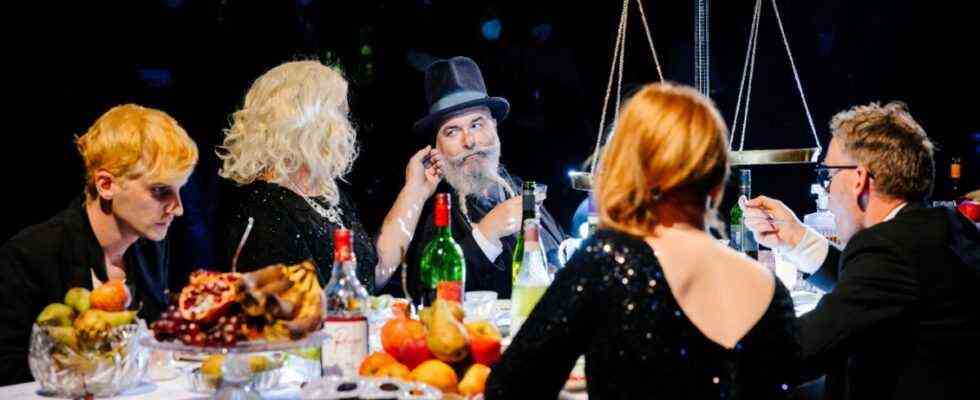The triumph of the podcast is the death of the drama, at least if the directors think that due to the boom they have to transfer this format one to one to the stage. The international summer festival in Hamburg on Kampnagel, actually a lively institution for performing games, showed in its opening week what it means to ban the arts in the headphones. The majority of the opening offer in the 35th year of this festival was a lonely radio play. Although the festival motto is “Togetherness”, the audience mostly listened to themselves.
Your ears are pulled through the festival
Rimini-Protokoll chose the cheapest variant of an app for their “walks”. Speakers from children to senior citizens spoke moderately original suggestion texts via traffic lights, cemeteries or visits to the theater, while the listeners could choose where to go. The acoustic theater experts from Ligna drove their audio walk performance with listening commands on the orphaned sales areas of the Kaufhof department store. An audio production by Abhishek Thapar, dubbed a “world premiere”, lasted 17 minutes and 33 seconds at a table under a staircase, where one listened to the experience report of an immigrant who works in the service sector in Germany with a water carafe.
The festival guests to the Dieter Roth Museum, which the artist had set up in a splendid Eppendorf villa in the 1990s, were pulled by the ears. There they learned from the audio files before Roth’s Schimmelkunst that Christoph Marthaler once drank so much gin in the restaurant with this that he fell over and pulled the tablecloth of a magnificently laid table with him. The “Oracle” installation by Susanne Kennedy and Markus Selg, which was shown in the Kammerspiele in 2020 with acting interactions, was only available as a VR version. Here the isolated visitor sailed through mystical images with eyes, planets and natural idyll, while esotherapeutic whisperings about the fragility of the ego sounded from the headphones.
And the opening premiere, which this time was not allowed to be a big theater or dance performance, but a semi-acoustic concert fits into this list of radio play hours. The Canadian singer Feist crouched on a green pedestal, played the guitar in an astonishingly sloppy manner and sang melancholy sounds as clear as a bell, while videographers projected the audience’s feet, the contents of a handbag and similar trivial items onto the walls of the great hall. Where did it go, the intelligent spectacle, staged by professional actors who grapple with the world? For example with the queer adaptation of “Buddenbrooks”, which the collective “Nesterval / Queereeoké” set up as a St. Pauli underworld farce in the bunker club “Bad & Dangerous”?
The production showed off with a huge ensemble and costume battle. But this very long evening of compulsory participation was ultimately only conclusive proof that the radical theses of the identity activists, to which Amazon film production now also wants to bow, will mean the creeping demise of the performative arts. When roles are only allowed to be embodied by people who actually are what they represent, acting becomes boring self-expression. In this case, a demonstration seminar on queer nightlife.
Christoph Marthaler and Susie Wang save the festival from a total crash
Participatory theater in particular, which demands a lot from its viewers, only leaves the coercion stage if it is implemented by experienced actors – exemplified by the Danish-German group Signa, whose strenuous psychological worlds are worked through to the smallest detail. But when many laypeople who enjoy exuberant behavior organize the dime novel version of world literature as an embarrassing hunt for the audience, poking dildos in their butts, reciting wooden dialogues and dancing wildly to Peaches’ “Fuck the Pain Away”, then it doesn’t help that they do People are all very personable. The artistic result is the uncomfortable situation of watching people do something they can’t.
In their funny and nasty splatter comedy “Light and Love”, the group Susie Wang shows how to put holidays in the sand.
(Photo: Simen Ulvestad)
Christoph Marthaler and the group Susie Wang, as theater producers, had to save the prelude from hearing loss. The wonderfully absurd texts by Dieter Roth, which Marthaler staged last year in a neat universe of pills for five pharmacists and a ghost in Zurich, is a great moment of grotesque musicality. The constant sparking dialogue between the two Swiss artists (one of them dead since 1998) in “Das Weinen (das Wähnen)” showed in fine tones why theater so desperately needs ingenious role-play. The art of Liliana Benini, Magne Håvard Brekke, Olivia Grigolli, Elisa Plüss, Nikola Weisse and Susanne-Marie Wrage creates worlds that go far beyond the personal: Because they can transform.
And that is no less true for the new splatter comedy “Light and Love” by the Norwegian disaster artist Susie Wang. They shoveled a nasty sand grave in anticipation of an ideal vacation world. With the appearance of their Arab landlady and their ominous announcements, a German couple who thinks they are in a sun oil paradise, slides deeper and deeper into a gruesome mess of physical fears and mutations. The hilarious transformation of a prospectus vacation into horror tells a complex story of the consequences of that ignorance that we call our right to consumption. In the end, it was very worthwhile to listen.

